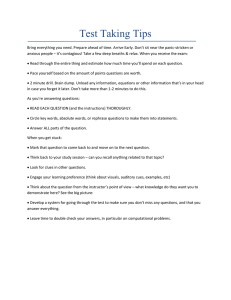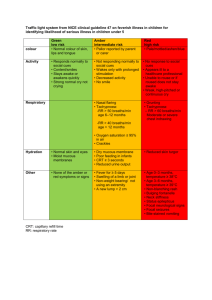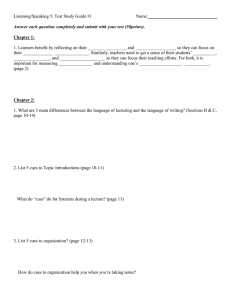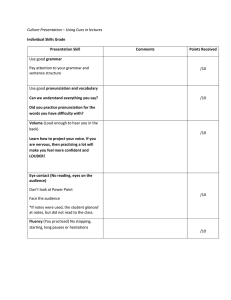Cool Down Cards - YMCA of Central Ohio
advertisement
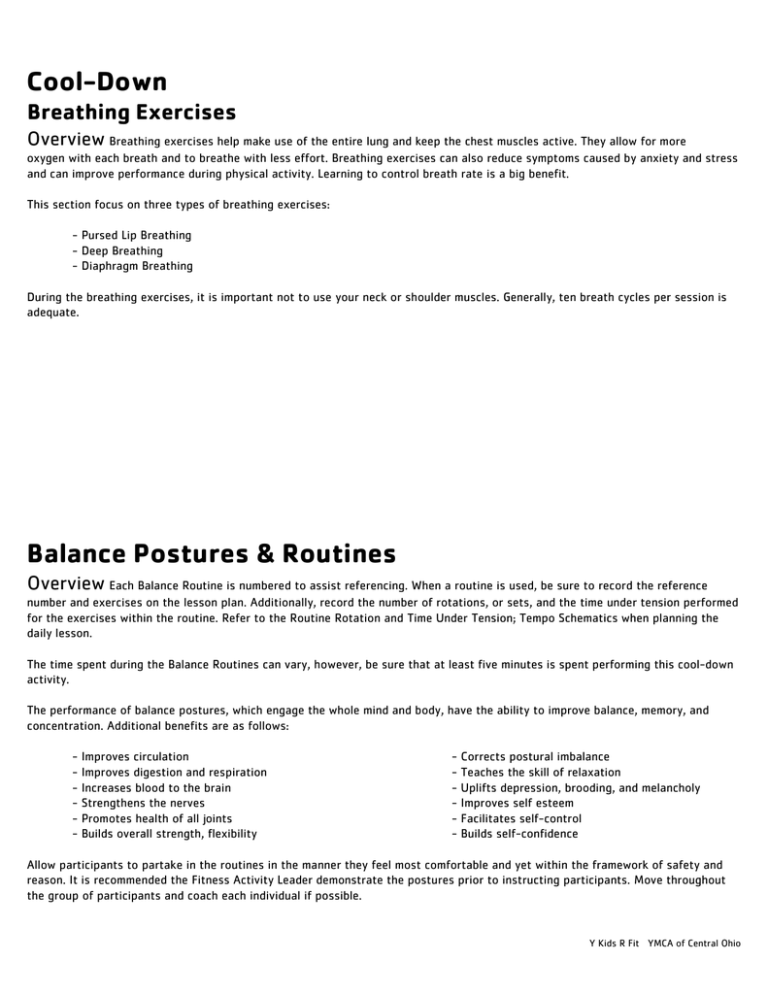
Cool-Down Breathing Exercises Overview Breathing exercises help make use of the entire lung and keep the chest muscles active. They allow for more oxygen with each breath and to breathe with less effort. Breathing exercises can also reduce symptoms caused by anxiety and stress and can improve performance during physical activity. Learning to control breath rate is a big benefit. This section focus on three types of breathing exercises: - Pursed Lip Breathing - Deep Breathing - Diaphragm Breathing During the breathing exercises, it is important not to use your neck or shoulder muscles. Generally, ten breath cycles per session is adequate. Balance Postures & Routines Overview Each Balance Routine is numbered to assist referencing. When a routine is used, be sure to record the reference number and exercises on the lesson plan. Additionally, record the number of rotations, or sets, and the time under tension performed for the exercises within the routine. Refer to the Routine Rotation and Time Under Tension; Tempo Schematics when planning the daily lesson. The time spent during the Balance Routines can vary, however, be sure that at least five minutes is spent performing this cool-down activity. The performance of balance postures, which engage the whole mind and body, have the ability to improve balance, memory, and concentration. Additional benefits are as follows: - Improves circulation - Improves digestion and respiration - Increases blood to the brain - Strengthens the nerves - Promotes health of all joints - Builds overall strength, flexibility - Corrects postural imbalance - Teaches the skill of relaxation - Uplifts depression, brooding, and melancholy - Improves self esteem - Facilitates self-control - Builds self-confidence Allow participants to partake in the routines in the manner they feel most comfortable and yet within the framework of safety and reason. It is recommended the Fitness Activity Leader demonstrate the postures prior to instructing participants. Move throughout the group of participants and coach each individual if possible. Y Kids R Fit YMCA of Central Ohio Breathing Exercises A. Pierced Lip Breathing Cues: Breathe in slowly through your nose for 1 to 2 seconds. Purse your lips as if you were going to whistle. Breathe out gently through pursed lips twice as slowly as you inhaled. Let the air escape naturally and don't force the air out of your lungs. Continue as necessary or for ten cycles. B. Deep Breathing Cues: Sit or stand, pull your elbows back firmly, and inhale deeply. Hold your breath for about 5 counts. Exhale slowly and completely. Continue as necessary or for ten cycles. C. Diaphragm Breathing Cues: Lie on your back with your knees bent. Place your fingers on your belly just below your ribcage. Inhale deeply for a count of 3 (your belly and lower ribs should rise while your chest remains fairly still) Exhale for a count of 6 (puckering your lips can help you exhale slowly) Continue as necessary or for ten cycles. … Continue to balance postures. Balance Routines A. Warrior III Cues: Step one foot forward and shift all of your weight onto this leg. Inhale, lift the arms over your head, and interlace the fingers, pointing the index finger up. As you exhale, lift the left leg up and out, hinging at the hips to lower the arms and torso down towards the floor. Look down at the floor and stare at a point for balance. Reach out through the toes and the crown and fingers making one straight line. Breathe and hold for 2-6 breaths. Repeat on other side. B. Tree Cues: Bend one knee shifting all the weight into the other leg. Turn the bent knee to the wall resting the heel against the straight leg. Look down at the floor and stare at one point. Slowly slide the foot up the straight leg, only as high up as you can maintain your balance. When you are balanced here, slowly bring the palms together to prayer position in front of the heart. The shoulders are down and back and the chest is pressing forward. Breathe and hold for 4-8 breaths. C. Bound Angle Cues: From a seated position, bring the bottoms of the feet together in towards the hips with the knees bent out to the sides. Interlace the fingers around the toes; use the arms to drop the shoulders down and back and to press the chest forward. Inhale and slowly lean back to lift the feet an inch or two off of the floor. Slowly lift the feet up to the level of the heart. Press the bottoms of the feet together and kick the feet into the arms, pull the feet towards the chest, and press the chest towards the feet. Stare at the big toes for balance. Breathe and hold for 2-6 breaths. (Prayer hand position shown at left) … Repeat up to 2 more times Y Kids R Fit YMCA of Central Ohio D. Dancer Cues: Bend one knee, bringing all your weight into the other leg. Stare at a point on the floor for balance. Slowly inhale and lift the bent leg up while holding the foot or ankle. Inhale the free hand up towards the ceiling. As you exhale, kick the foot into the arm, allowing the leg and foot to lift up towards the ceiling. As the leg lifts up, hinge at the hips and with a straight back lower the arm and torso down towards the floor. Keep the hips parallel to the floor. Breathe deeply and hold for 2-4 breaths. Repeat on other side. E. Eagle Cues: With both arms raised, exhale and wrap the left arm under the right, bend the elbows and bring the palms together with the thumbs crossed. Gently pull the elbows down, working on bringing the fingertips below the level of the nose. Exhale and bend both knees. Shift your weight to the right foot. Inhale and lift the left up, crossing it over the right knee and wrapping it around the right leg. Bring the left toes behind the right ankle. Keep the knees and elbows in line under the nose. Press the shoulders back to keep from leaning forward. Breathe and hold for 2-6 breaths. F. Boat Cues: Bend the knees, bringing the feet flat to the floor with the legs together. Interlace the fingers around the knees. Press down through the hips and up through the crown to lengthen the spine. Use the arms to drop the shoulders down and back and to press the chest forward. Release the arms forward, parallel to the floor with the palms facing down. Slowly inhale and lean back lifting the heels and inch or two off of the floor. Keep the chest open and the shoulders down and back. Slowly begin to straighten the legs, kicking out through the heels, lifting the legs up as high as comfortable. Keep the chest open and the shoulders down and back. Breathe and hold for 2-6 breaths. … Repeat up to 2 more times J. Half Moon Cues: From a standing position, interlace the fingers, pointing the index finger up over the head, press the feet into the floor and reach the fingers and crown up while relaxing the shoulders down and back. Exhale and press the hips forward, arching the spine back. Keep the feet grounded and the legs and buttocks engaged. Reach up and out through the fingers and crown. Breathe and hold for 2-6 breaths. K. Bear Cues: From a seated position, hold on to each foot with each hand. Inhale and lean backwards to lift both heals an inch or two off of the floor. Stare at a point on the floor for balance, keep the shoulders down and back with the chest pressing forward and up towards the ceiling. Slowly inhale and kick the legs into the arms, straightening the legs and lifting them up and out towards the corners of the room. Breathe and hold for 2-6 breaths. L. Side Plank Cues: From push-up position, bring the right palm to center on the floor. Bring the outside of the right foot on the floor in line with the palm. Stack the left foot on top of the right, with the inner edges of the feet in contact. Press the right hand down into the floor and lift the hips making the legs and torso one straight line. When you feel balanced, lift the left hand up towards the ceiling, making the arms one straight line. Scissor the legs for additional stability if needed. Look straight ahead, with the chin off the chest. Breathe and hold for 2-5 breaths. Repeat on other side. … Repeat up to 2 more times Y Kids R Fit YMCA of Central Ohio G. Head to knee Cues: Shift your weight to one foot and slowly bend and lift the other knee in towards the chest, interlacing the fingers below the kneecap. Stare at one point on the floor or the wall to maintain balance. Move the fingers from the knee to the left foot, pulling the leg in towards the torso. Slowly extend the left leg out, kicking the foot into the arms. Keep the shoulders down and back and the chest open. Round the spine, pressing the forehead to the left leg. Let your gaze shift to the kneecap or the floor. Breathe and hold for 2-4 breaths. Repeat on other side. H. Prayer Cues: Move in to a squat position, pressing the hips down towards the heels. Walk the feet a little further apart until the torso is not resting against the thighs. The feet can either be flat to the floor or the toes can remain tucked under. Slowly bring the palms together in front of the heart with the elbows pressing against the knees. Use the arms to press the knees apart, deepening the stretch in the hips. Stare at one point on the floor for balance. Roll the shoulders down and back and press the chest towards the thumbs. Breathe and hold for 4-8 breaths. I. Table Cues: From hands and knees, inhale the right leg up parallel to the floor, reaching the toes towards the back wall. Starring at a point between the palms, slowly inhale the left arm up parallel to the floor, reaching the fingers towards the front wall. Breathe and hold for 3-6 breaths. Repeat on other side … Repeat up to 2 more times M. Triangle Cues: From a lunge position with the left foot forward, inhale and step forward into the left foot, straightening the left leg. Straighten the right leg up parallel to the floor. Staring at a point on the floor, place the left palm directly under the left shoulder and carefully bring the right hand to the right hip. Roll the right hip up and back so the hips face the sidewall. Inhale the right fingertips up towards the ceiling. Turn the head to face the sidewall. Work on turning the whole torso to face the sidewall. Breathe and hold for 3-5 breaths. Repeat on other side. N. Downward Dog Cues: From hands and knees, tuck the toes under and lift the hips up towards the ceiling. Place palms shoulder width apart, pressing into the floor. Using straight arms, press the hips up and back. Keep the spine straight and long. The feet are hip's width apart with the toes facing forward. Press the heels into the floor while keeping legs straight, or you can have a small bend at the knees to keep the back flat. Let the head and neck hang freely from the shoulders or look up at the belly button. Breathe and hold for 2-6 breaths O. Boat Cues: Bend the knees, bringing the feet flat to the floor with the legs together. Interlace the fingers around the knees. Press down through the hips and up through the crown to lengthen the spine. Use the arms to drop the shoulders down and back and to press the chest forward. Release the arms forward, parallel to the floor with the palms facing down. Slowly inhale and lean back lifting the heels and inch or two off of the floor. Keep the chest open and the shoulders down and back. Slowly begin to straighten the legs, kicking out through the heels, lifting the legs up as high as comfortable. Keep the chest open and the shoulders down and back. Breathe and hold for 2-6 breaths. … Repeat up to 2 more times Y Kids R Fit YMCA of Central Ohio P. Half Moon Twist Cues: From a lunge position, with the right leg forward, place left palm on the floor. Inhale and lift the left leg up, straightening both legs, bringing the left leg parallel to the floor. Stare at a point on the floor for balance. Slowly inhale and lift the left hand up to the left hip. Roll the left hip up towards the ceiling, turning the hips towards the sidewall. Slowly inhale and reach the left hand up towards the ceiling. Slowly turn and look at the sidewall, staring a one point. Breathe and hold for 3-6 breaths. Repeat on other side. Q. Half Lotus Forward Fold Cues: From standing position, shift your weight to the right foot and slowly bring the left foot above the thigh with knee bent to side. Reach the left arm around your back. Keep the shoulders down, the chest open and the hips and chest facing forward. Inhale the right arm up towards the ceiling. Let your gaze drop towards the floor, staring at one point for balance. Exhale and slowly fold forward, bringing the right palm or fingers to the floor. Keep the standing leg straight; press the bent knee towards the back wall. Gently pull your forehead closer to your right leg. Breathe and hold for 2-6 breaths. R. Hand To Toe Cues: From standing position, slightly bend the right knee shifting your weight to the left foot. Stare at a point on the floor or in front of you for balance. Inhale and lift the right foot up, interlace the right middle and index finger around the right big toe. Bring your left hand on the left hip. Roll the shoulders down and back and press the chest open. Slowly inhale and begin to straighten the right leg out in front of you, towards the front wall. Press out through the heel, gently pull back on the toe and press the right shoulder blade towards the back wall. Breathe and hold for 3-6 breaths, keeping your gaze locked onto one point. Repeat on other side. … Repeat up to 2 more times Cool-Down Part 2 Stretching Conditions The Stretching component of the daily lesson should be included at the end of the cool-down. It is advised that stretching exercises be performed only at this time and not prior to any of the activities. Range of movement is critical to good performance; a lack of it can contribute to improper biomechanics, overuse injuries and fatigue. The repetitive action of many exercise activities can easily create a muscular imbalance if stretching is not included as an integral part of the routine. Objective The stretching exercises are intended to offset potential problems and contribute to improved performance by increasing the rage of movement within each joint. Additionally, stretching can promote muscular relaxation and postural awareness while returning muscles to pre-exercise length. Guidelines Before implementing the stretching routines in your lessons, make certain to have learned how to perform and demonstrate each of the exercises. Additionally, review the Time Under Tension; Tempo Schematic, the Routine Rotation Schematic, and The Leader’s Technique, and Using The Lesson Plans to ensure a full command of the subject. Never stretch a cold muscle and only stretch to a position of mild tension, never pain. The stretching component should last for about 5 minutes. Each stretch is to be static, or in other words, performed slowly, with control, and held as still as possible. Y Kids R Fit YMCA of Central Ohio Stretching Routines Overview Each Stretching Routine is numbered to assist referencing. When a routine is used, be sure to record the reference number and the stretches on the lesson plan. Additionally, record the number of rotations, or sets, and the time under tension performed for the exercises within the routine. Refer to the Routine Rotation and Time Under Tension Tempo Schematics when planning the daily lesson. Stretching Routines The time spent during the Callisthenic Routines can vary; however, allot about five minutes for this component. Remember the importance of control during the performance of the stretching exercises. Allow participants to partake in the routines in the manner they feel most comfortable and yet within the framework of safety and reason. It is recommended the Fitness Activity Leader demonstrate the stretches prior to instructing participants. Move throughout the group of participants and coach each individual if possible. Y Kids R Fit YMCA of Central Ohio Stretching Routines A. Big Hug Cues: While standing, take each hand and grab as far around to the back of the opposite shoulder as you can. You should now look like you are giving yourself a big hug! Tuck your chin in towards your chest and crunch your stomach muscles. Be sure to breath freely through the stretch. B. Big Fish Cues: Open your arms as wide as you can, as if you were saying “I caught a fish this big!” Be sure to pull your arms way behind your body by squeezing the muscles between your shoulder blades. If you are doing this stretch correctly, you will feel the stretch across your chest and bicep muscles. C. Toe Jam Cues: Sit on the floor with your legs straight out in front of you. Keeping your knees extended, reach as far towards your toes as you can. With your hands, see how far down on your legs you can touch without it hurting! Remember not to bounce. … Repeat up to 2 more times G. Booboo On My Elbow Cues: Take one arm across your chest while the hand of the opposite arm gently pulls it further across and into your body. It should look like you are trying to get a better look your elbow! Repeat on the next side. H. Tree Top Cues: With one arm, reach far over your head and gently over to the opposite side of your body. It’s as if the wind were blowing at your treetop, making your trunk curve to the side. If you are doing this one correctly, you should feel the stretch along the side of your body. Repeat this stretch in the other windward direction. I. Butterfly Cues: Sitting down with legs extended, draw both feet in towards your buttocks. Using your forearms and elbows, gently push downward on your legs. It should look as if you created butterfly wings! However, there will be no flying here today, so hold those wings down! If you are doing this one right you should feel a stretch on the inner thigh area of both legs. … Repeat up to 2 more times Y Kids R Fit YMCA of Central Ohio D. Up, Up & Away Cues: Reach both arms straight over your head like you are trying to fly off of the ground! Not flying? Reach further towards the sky! Come on! R-E-A-C-H-! E. Shrunken Y-Kid Cues: While standing with your feet shoulder width apart, squat all the way down until you are sitting on your heels. Open your knees a bit so as to let your upper body fit between them. Reach both arms forward and as far away from your body as you can. Try tucking your chin and letting your bottom drop toward your feet. F. Pizza Pie Cues: Extend you legs out in front of you and separate them so as to create a pie shape. Using your hands, reach towards the middle. From that point, move towards one foot, hold, and then move across to the other foot. Go slow! … Repeat up to 2 more times Slow motion tag Description: Choose 1 tagger. Everyone must move in slow motion, even talk in slow motion. If tagged, must wait for another player to un-freeze them. If a player moves quickly- make them freeze. Y Kids R Fit YMCA of Central Ohio Car and driver Description: Group children into pairs. Create an easy obstacle course for each pair with cones or polly spots. Have one child start as the car and the other as the driver. Have the driver place their hand on the cars shoulder. The car should have his/her eyes closed. Have the driver guide the car around the obstacle course. Have children change rolls after the course is competed. Tips: Explain that the driver must use commands such as slow, stop, go, left, right, backwards, etc. Explain that the car must trust the driver. The game can also be played without the driver having his/her hands on the car – they can say things like take two big steps forward or two small steps to the left. Human knot Description: Have children stand closely face-to-face in a circle. Have each child grab with one hand another child’s hand from across the circle and with the other hand, another (different) child’s hand from across the circle (make sure they do not grab the same persons hand, or the two people next to them). After each child is holding another child’s hand with both hands, have the children work together to try and untangle the “human knot”. Make sure no one lets go of the hands they are holding. The children can go under and over to try and untangle the knot. Tips: Use a lot of communication so that the children work together and help each other to figure out how to untangle themselves. It’s ok if during the process some or all children end up facing the opposite directionjust make sure they are still holding hands. Y Kids R Fit YMCA of Central Ohio
